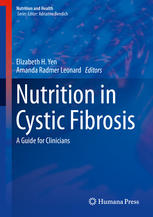

Most ebook files are in PDF format, so you can easily read them using various software such as Foxit Reader or directly on the Google Chrome browser.
Some ebook files are released by publishers in other formats such as .awz, .mobi, .epub, .fb2, etc. You may need to install specific software to read these formats on mobile/PC, such as Calibre.
Please read the tutorial at this link: https://ebookbell.com/faq
We offer FREE conversion to the popular formats you request; however, this may take some time. Therefore, right after payment, please email us, and we will try to provide the service as quickly as possible.
For some exceptional file formats or broken links (if any), please refrain from opening any disputes. Instead, email us first, and we will try to assist within a maximum of 6 hours.
EbookBell Team

4.4
102 reviewsNutritional therapies have been key early interventions, and remain central to the well-being and survival of patients with cystic fibrosis. The nature of the disease causes significant alterations in a patient’s ability to process and assimilate nutrients. Furthermore, many factors contribute to higher metabolic demands throughout a patient’s life. In combination, maldigestion, malabsorption, and increased metabolic demands pose a high hurdle for the patient to overcome in order to maintain optimal nutritional status.
Nutrition in Cystic Fibrosis: A Guide for Clinicians is an excellent resource for physicians, nurses and dietitians who deliver care for patients with cystic fibrosis. The book provides an introduction to cystic fibrosis and nutritional assessments. It will also serve as a comprehensive guide to the nutritional monitoring and management of patients with cystic fibrosis including special populations within cystic fibrosis that require additional considerations. The chapters are written by experts in their fields and include the most up to date scientific and clinical information.
Nutrition in Cystic Fibrosis: A Guide for Clinicians targets pediatric and adult pulmonologists and gastroenterologists, residents and fellows, internists, pediatricians, nurses, dietitians and general practitioners who treat patients with cystic fibrosis.